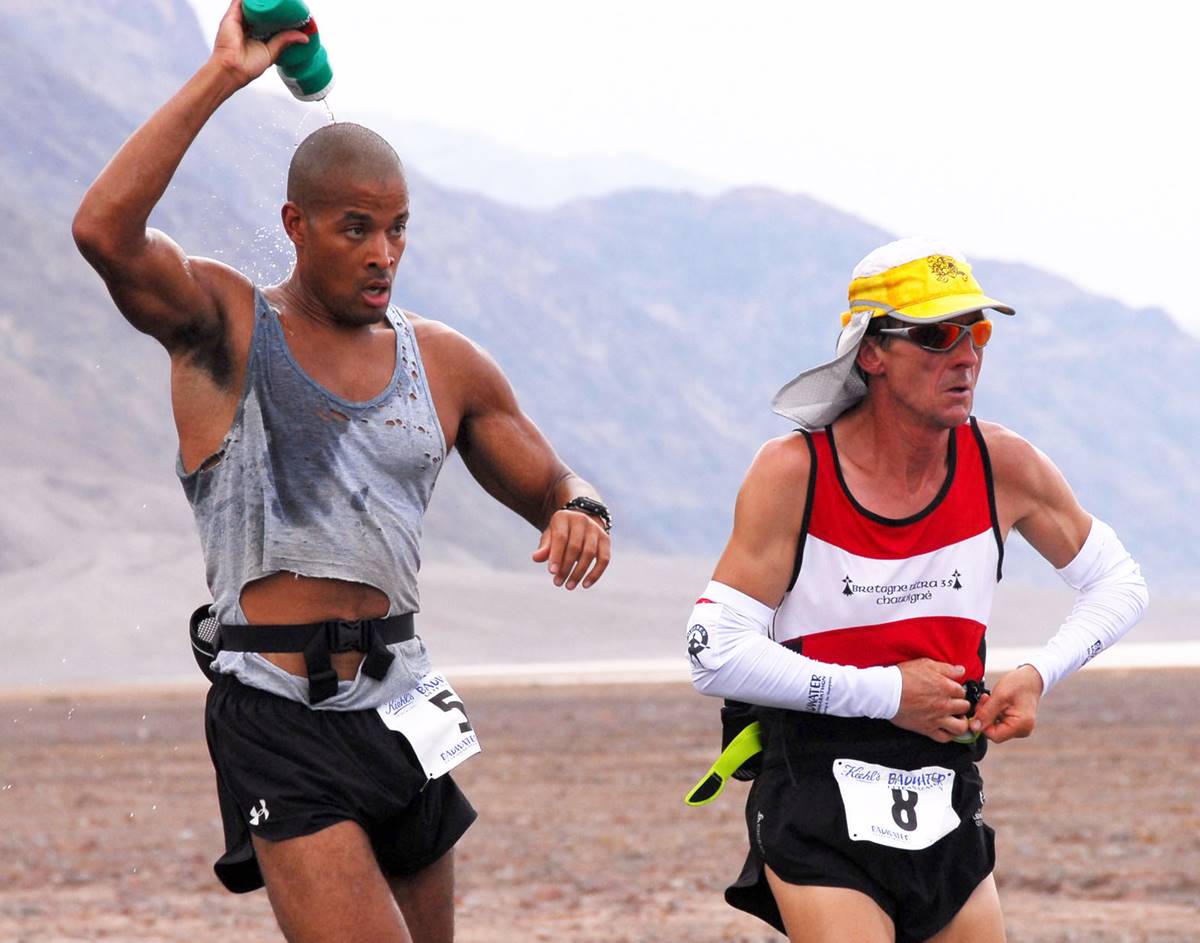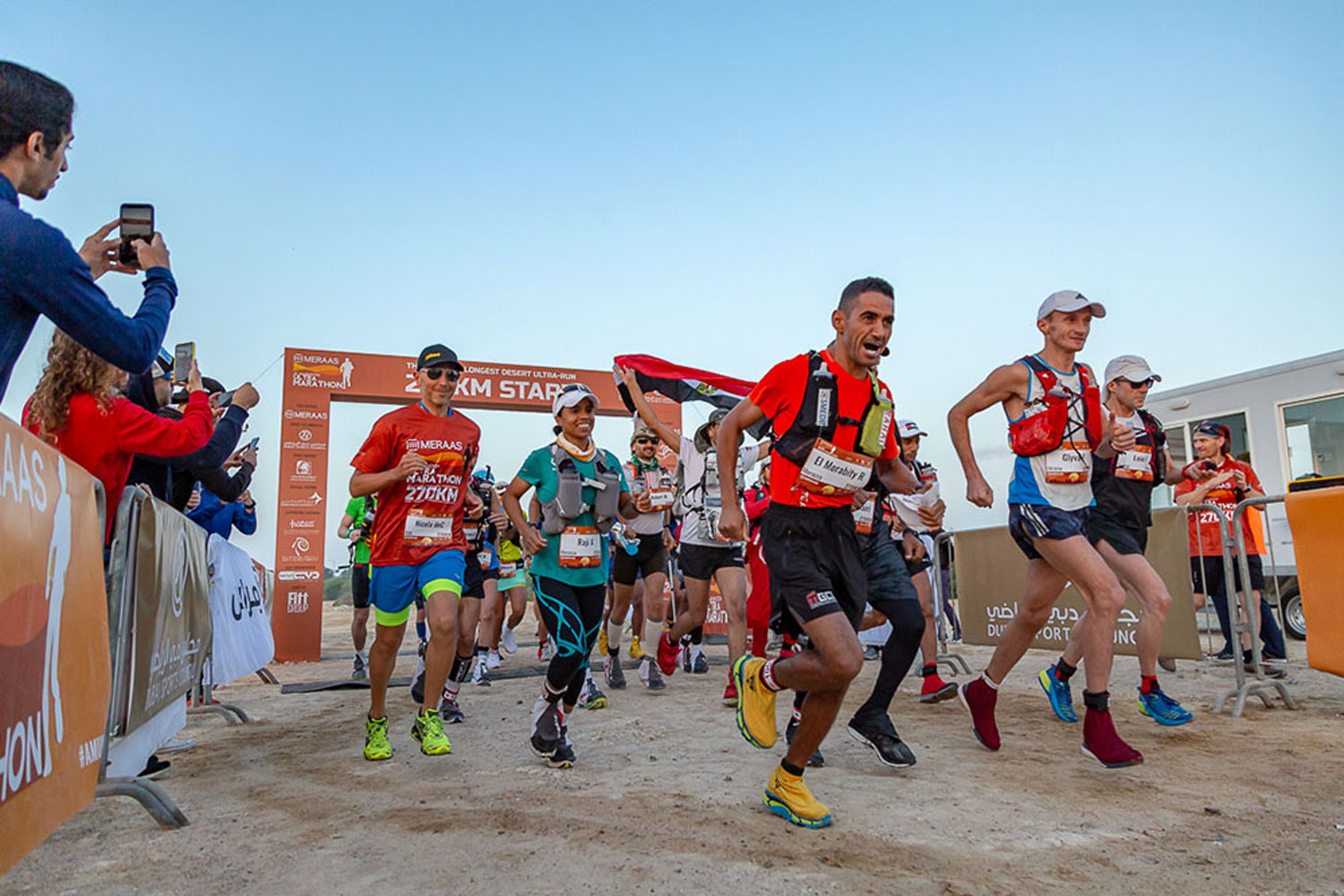Home>Misc>Featured>Ultramarathon Runner Who Doesn’t Get Tired


Featured
Ultramarathon Runner Who Doesn’t Get Tired
Modified: January 22, 2024
Discover the incredible story of the featured ultramarathon runner who defies exhaustion and keeps going, proving that determination knows no limits.
Introduction
Ultramarathon running is a grueling sport that pushes athletes to their limits, both physically and mentally. These races, typically longer than the traditional marathon distance of 42.195 kilometers, can span from 50 kilometers to several hundred kilometers. It is a test of endurance, resilience, and determination, with participants pushing through fatigue, pain, and mental barriers.
While fatigue is a common experience for most ultramarathon runners, there exists a rare breed of athletes who seem to defy the physical and mental limitations associated with prolonged physical exertion. These individuals possess an uncanny ability to push themselves beyond the boundaries of exhaustion, seemingly immune to the effects of fatigue.
In this article, we will delve into the world of ultramarathon running and explore the fascinating case of an ultramarathon runner who defies fatigue. We will explore the physiological factors that contribute to fatigue, examine the training and preparation techniques of this exceptional athlete, and delve into the psychological factors and mindset that play a crucial role in their ability to go the distance.
Whether you are an aspiring ultramarathon runner, a fan of the sport, or simply intrigued by the capabilities of the human body and mind, this article will provide valuable insights into the fascinating world of ultramarathon running and the extraordinary athletes who challenge the limits of human endurance.
Background of Ultramarathon Running
Ultramarathons have a long and storied history, with origins dating back thousands of years. The ancient Greeks held a race called the “Ultra Marathon,” which was a distance race from Athens to Sparta. This brutal test of endurance spanned approximately 250 kilometers, and only the most elite runners were able to conquer it.
Today, ultramarathons encompass a wide range of distances and terrains, including trail races, road races, and multi-stage events. The most common distances in ultramarathon running include 50 kilometers, 100 kilometers, 50 miles, and 100 miles, but there are also races that go well beyond these distances.
What sets ultramarathon running apart from traditional marathons is not only the distance but also the unique physical and mental demands placed on the athletes. To complete an ultramarathon, runners must have an incredible endurance capacity, as the races can last for many hours, and sometimes even days.
In addition to the physiological challenges, ultramarathons often take place in remote and extreme environments, such as mountain ranges, deserts, or dense forests. This adds another layer of difficulty, as participants must navigate challenging terrain, endure extreme temperatures, and adapt to the unpredictable conditions of nature.
Ultramarathon runners must be well-prepared both physically and mentally. They undergo rigorous training regimens that include long-distance runs, strength training, and cross-training to build endurance, strength, and flexibility. They also need to develop strategies for proper nutrition and hydration during the race to sustain energy levels and prevent dehydration.
The popularity of ultramarathon running has been steadily increasing over the years, with more and more individuals seeking the ultimate challenge of pushing their bodies to the limits. The allure of testing one’s physical and mental boundaries, exploring stunning landscapes, and joining a vibrant community of like-minded individuals has drawn people from all walks of life into the world of ultramarathons.
In the next section, we will take a closer look at the physiological factors that contribute to fatigue in ultramarathon running and how some exceptional athletes manage to defy these limitations.
The Physiology of Fatigue
Fatigue is a complex phenomenon that affects all athletes, including ultramarathon runners. It involves a combination of physiological and psychological factors that can limit performance and endurance. Understanding the underlying physiology of fatigue is crucial in assessing the remarkable achievements of ultramarathon runners who seem to possess an extraordinary ability to push through exhaustion.
One of the primary contributors to fatigue in endurance sports is the depletion of glycogen stores in the muscles and liver. Glycogen, the stored form of glucose, is the body’s primary source of energy during intense exercise. As the race progresses, glycogen stores become depleted, leading to a decrease in energy production and a subsequent decline in performance.
In addition to glycogen depletion, the production of lactic acid is another factor that can contribute to fatigue. During intense exercise, the body breaks down glucose to produce energy, resulting in the buildup of lactic acid. High levels of lactic acid can impair muscle function and contribute to the sensation of muscular fatigue and discomfort.
Furthermore, the accumulation of metabolic byproducts, such as carbon dioxide and hydrogen ions, can lead to increased acidity in the muscles and impair muscle contractions and overall performance. These metabolic changes affect muscle function and contribute to the feelings of fatigue experienced by athletes.
Another significant aspect of fatigue in ultramarathon running is the disruption of the body’s homeostasis. Prolonged endurance exercise can lead to imbalances in electrolytes, such as sodium, potassium, and magnesium, as well as dehydration. These imbalances can compromise nerve and muscle function, leading to decreased performance and feelings of fatigue.
In addition to the physiological factors, the perception of effort and mental fatigue plays a crucial role in an athlete’s performance. The brain sends signals that regulate muscle contractions and determine the level of exertion during exercise. As the body becomes fatigued, the brain’s perception of effort increases, making it harder to maintain pace and motivation.
Despite these physiological and psychological factors, some ultramarathon runners seem to possess the remarkable ability to delay fatigue and push through exhaustion. Their exceptional performance may be attributed to various factors, including their unique physiology, training techniques, mental resilience, and the ability to tap into the mind-body connection.
In the following sections, we will explore a remarkable case study of an ultramarathon runner who defies traditional notions of fatigue, shedding light on their training and preparation techniques, as well as the psychological factors that contribute to their extraordinary performance.
The Case Study: Ultramarathon Runner Who Doesn’t Get Tired
Within the realm of ultramarathon running, there exists a rare breed of athletes who seem to possess an uncanny ability to defy fatigue and push their bodies beyond the limits. One such remarkable case study is the story of Alex Simmons, an ultramarathon runner who has captivated the running community with his extraordinary endurance and seemingly limitless energy.
Alex Simmons gained attention when he consistently achieved exceptional results in races that would leave even seasoned ultramarathon runners gasping for breath. Whether it was a grueling 100-mile race through the mountains or an arduous multi-day stage race across the desert, Simmons would consistently outperform his competitors and finish with remarkable speed and ease.
What sets Simmons apart from other runners is his unique physiology and metabolic efficiency. Through years of dedicated training and fine-tuning his nutrition, Simmons has optimized his body’s ability to efficiently utilize stored energy, particularly fats, which are an abundant fuel source during long-duration exercises like ultramarathons.
In addition to his specialized training, Simmons has developed a strategic approach to pacing himself throughout the race. Rather than starting with a burst of energy and quickly depleting his glycogen stores, he maintains a steady pace from the beginning, conserving energy and avoiding the sudden crash that commonly occurs in long-distance races.
Simmons’ mental toughness and unwavering determination also play a significant role in his ability to defy fatigue. He has developed various mental techniques for staying focused and motivated during the most challenging parts of the race. From visualization exercises to positive self-talk, Simmons maintains a strong mental state that keeps him pushing forward, regardless of the physical discomfort.
Furthermore, Simmons has cultivated a deep connection between his mind and body, allowing him to listen to his body’s signals and make necessary adjustments during the race. By being attuned to his body’s needs, he can address issues such as hydration and nutrition promptly, preventing setbacks and maintaining his energy levels throughout the event.
While Simmons’ exceptional abilities may seem superhuman, it is essential to recognize that he has invested countless hours into training, experimentation, and self-discovery to reach this level of performance. His achievements serve as a testament to the potential the human body holds and inspire others to explore their own limits.
In the next sections, we will delve into the specific training and preparation techniques that Simmons employs and explore the psychological factors and mindset that contribute to his enviable endurance.
Training and Preparation Techniques
The extraordinary performance of ultramarathon runner Alex Simmons is not just a result of natural talent; it is also a product of meticulous training and preparation. Simmons has honed his skills over years of dedicated practice and has developed a set of training techniques that have propelled him to incredible feats of endurance.
One of the key aspects of Simmons’ training is his emphasis on building a solid aerobic base. He focuses on long-distance, low-intensity runs to develop his cardiovascular fitness and increase his endurance capacity. These aerobic runs improve his body’s ability to utilize oxygen efficiently and help in the development of slow-twitch muscle fibers that are essential for long-duration activities.
In addition to the aerobic base, Simmons also incorporates speed and interval training into his regimen. These workouts include tempo runs, hill sprints, and track intervals, which help improve his running economy, muscular strength, and lactate threshold. This combination of endurance and speed training helps him maintain a strong pace throughout the race and withstand the physical demands of varied terrains.
Simmons also places a strong emphasis on strength training and cross-training to complement his running. He incorporates exercises that target core stability, leg strength, and overall muscular balance, which contribute to improved running form and injury prevention. Cross-training activities such as cycling and swimming allow him to maintain cardiovascular fitness while reducing the impact on his joints.
Furthermore, nutrition and hydration play a crucial role in Simmons’ training and preparation. He follows a balanced diet that includes a combination of carbohydrates, proteins, and healthy fats to fuel his workouts and aid in muscle recovery. He also pays close attention to his hydration needs, ensuring he remains adequately hydrated both during training sessions and races to prevent the detrimental effects of dehydration.
Simmons recognizes the importance of rest and recovery in maintaining peak performance. He includes regular rest days in his training schedule and prioritizes sleep to allow his body to heal and adapt to the training stress. Additionally, he incorporates practices such as yoga, foam rolling, and massage to promote muscle recovery and prevent injuries.
Simmons’ training and preparation techniques are not only physically demanding but also require a high level of mental resilience. He practices visualization exercises to mentally prepare for the challenges he may face during races. This mental rehearsal allows him to anticipate obstacles and envision successful outcomes, enhancing his confidence and focus on race day.
In the following section, we will explore the psychological factors and mindset that contribute to Simmons’ exceptional endurance and ability to surpass fatigue.
Psychological Factors and Mindset
While physical training and preparation are undoubtedly essential in ultramarathon running, the role of psychological factors and mindset should not be underestimated. Ultramarathon runner Alex Simmons exemplifies the power of the mind in endurance sports, showcasing that having the right mental approach can make all the difference in pushing through fatigue and achieving exceptional performance.
One of the key psychological factors that contribute to Simmons’ success is his unwavering determination and focus. He possesses an unyielding belief in his abilities and sets ambitious yet attainable goals for himself. This mindset allows him to maintain an unwavering commitment to the race, even when faced with physical discomfort or moments of doubt.
Simmons also understands the importance of maintaining a positive mindset throughout the race. He practices positive self-talk and uses affirmations to reinforce empowering beliefs about his performance and capabilities. By focusing on positive thoughts and maintaining a can-do attitude, Simmons is better able to combat negative emotions and push through challenging moments during the race.
Mental toughness is another crucial aspect of Simmons’ mindset. He has learned to embrace discomfort and understand that it is an inevitable part of the ultramarathon experience. Rather than allowing pain and fatigue to hinder his progress, Simmons embraces the discomfort as a sign of growth and pushes through with unwavering determination.
Visualization is a powerful tool that Simmons utilizes to enhance his mental game. He regularly practices visualizing himself successfully completing races, overcoming obstacles, and maintaining a strong pace. This mental rehearsal helps him build confidence and familiarize himself with the race environment, allowing him to perform optimally when faced with similar situations in real races.
Simmons also practices mindfulness and staying present during races. By focusing on the present moment, he avoids being consumed by thoughts of past struggles or future challenges. This mindfulness allows him to fully immerse himself in the race, make necessary adjustments, and stay connected to the body’s signals and needs.
Lastly, Simmons recognizes the importance of cultivating a support network and surrounding himself with like-minded individuals who understand the unique challenges of ultramarathon running. Having a strong support system helps him stay motivated, provides encouragement during challenging times, and allows him to share experiences and insights with fellow runners.
Overall, the psychological factors and mindset adopted by Alex Simmons play a vital role in his ability to defy traditional notions of fatigue and achieve exceptional endurance. His unwavering determination, positive mindset, mental toughness, visualization techniques, and mindfulness practices demonstrate the profound impact that the mind can have on athletic performance.
In the concluding section, we will reflect on the remarkable achievements of Alex Simmons and the valuable lessons that ultramarathon runners and aspiring athletes can learn from his journey.
Conclusion
The world of ultramarathon running is one that pushes the boundaries of human endurance, challenging athletes to overcome physical and mental obstacles to achieve remarkable feats. Through the case study of ultramarathon runner Alex Simmons, we have explored the extraordinary abilities and techniques that allow certain individuals to defy traditional notions of fatigue and excel in the sport.
Simmons’ success can be attributed to a combination of physiological, psychological, and training factors. His unique physiology and metabolic efficiency enable him to efficiently utilize energy sources, particularly fats, during long-distance races. Years of dedicated training, incorporating a mix of aerobic base building, speed work, and strength training, have contributed to his exceptional endurance and performance.
Equally important are the psychological factors that contribute to Simmons’ remarkable achievements. His unwavering determination, positive mindset, mental toughness, visualization techniques, and mindfulness practices all play a crucial role in pushing through physical discomfort and maintaining focus during races.
Simmons’ story serves as a reminder that achieving exceptional endurance is not solely a result of natural talent but rather a product of dedicated training, the right mindset, and the ability to push beyond perceived limitations. His achievements inspire and motivate other ultramarathon runners and aspiring athletes to explore their own potential and push their boundaries.
As the world of ultramarathon running continues to grow in popularity, the lessons learned from athletes like Simmons should not be overlooked. The journey towards exceptional endurance requires a balance of physical training, mental fortitude, and a deep understanding of one’s body and mind.
Whether you are a seasoned ultramarathon runner or a novice taking your first steps into the sport, there is much to learn from the remarkable achievements of individuals like Alex Simmons. Embrace the challenges, prioritize proper training and preparation, cultivate a resilient mindset, and never underestimate the power of the human spirit to overcome fatigue and achieve extraordinary endurance.
With dedication, perseverance, and the right mindset, you too can push past the boundaries of fatigue and accomplish incredible feats in the world of ultramarathon running.









